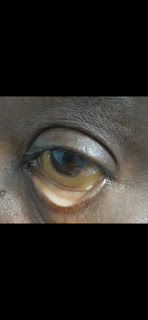Biweekly internal assesment assessment
https://swathibogari158.blogspot.com/2020/09/chronic-decompensated-liver-disease.html
Q1 Reason for this patients ascites
Might be due to liver cirrhosis
1.reduced albumin synthesis causes decreased oncotic pressure and transudation of fluid
2.reduced aldosterone metabolism causing
no aldosterone in circulation activating RAAS ,
salt and water retension causing ascites
A) underfilling of circulation due to hypoalbuminemia and salt water retention causes splancnic vasodilation that increases splanchnic arterial pressure and increases permeabilty which increases lymph accumulation
Ulcers might be due to
Lymph stasis causes thickening of skin due to protein crosslinking which might cause inadequate circulation gradually ischemia and he mighy have developed ulcers
efficacy of treatment intervention given
1. Air or water bed to prevent pressure bed sores in the dependent areas
Salt restriction <2.4gms/day to prevent retention of water due to osmotic gradient as sodium causes retention
3. Inj augmentin 1.2gm IV/BD to prevent secondary bacterial infections
4. Inj pan 40 mg IV/OD
5. Inj zofer 4mg IV/BD
6. Tab lasilactone (20/50)mg BD ( combination of furosemide and aldactone to decrease pedal oedema
If SBP <90mmhg - to avoid excessive loss of fluid
7. Inj vit k 10mg IM/ STAT ( as vitamin K causes coagulation to prevent further bleeding manifestions)
8. Syp lactulose 15ml/PO/BD for hepatic encephalopathy
9. Tab udiliv 300mg/PO/BD contain urodeoxycolic acid .UDCA has a choleretic effect, increasing hepatocellular bile acid excretion, as well as cytoprotective, antiapoptotic, and immunomodulatory properties.
10.syp hepameiz 15 ml/PO/OD as it has hepatoprotection properties
11.IVF 1 NS slowly at 30ml/hr to maintain hydration
12. Inj thiamine 100mg in 100mlNS /IV/TID as thiamine deficiency's occur in chronic alcoholics
13.strict BP/PR/TEMP/Spo2 CHARTING HOURLY
14.strict I/O charting
15.GRBS 6th hourly
16.protein x powder in glass of milk TID for protein supplementation and muscle wasting which commonly occurs in cirrhosis patients
17. 2FFP and 1PRBC transfusion to support coagulation pathways
Inj optineuron 1 amp in 100 ml NS Iv/bd for nutritional supplementation such as Vit B12
ATT to be with held for hepatoxicity although should be used based on CTP score mentioned above
Syp lactulose 15ml HS to prevent hepatic encephalopathy
Protein powder 3 to 4 scoops in 1 glass of milk or water QID for protein supplementation
Stop all OHA s
Grbs charting 6th hrly
Strict I/0 charting
High protein diet 4eggs daily for protein supplementation
ORS sachets in 1 litre of water to compensate electrolytes lost due to diarrhoea
Bp charting hourly
Inj PIPTAZ 4.5gm/IV/bd stat
Vit k 10 mg Iv OD for 5 days to prevent bleeding manifestations
Temp BP PR monitoring 4th hourly
IVF - 1 DNS @50ml/hr for hydration
Nebulisation with salbutamol and mucomist 12th hourly. for ?cough
Inj thiamine 100 mg in 100 ml NS IV TID. for chronic alcoholism.
1) What will be your further approach toward managing this patient of nephrotic syndrome? How will you establish the cause for his nephrotic syndrome?
A) 1.symptomactic treatment as we dont the cause of nepheotic sundrome
Salt restriction , protein diet
Lasix and aldactone for edema
Steroids starting from low dose can be started
Coagulation factors (antithrombin) might be lost in urine so prophylactic anticoagulany therapy can be started
Lipid abnormalities may be present in future hmgcoa reductase inhibitors can be useful
Loss of igs can cause sepsis which is major cause of death so prophylactic vaccines can be advised
Approach to the case:
Primary idiopathic glomerular disease
Membranous glomerulopathy
Minimal change disease
Focal segmental glomerulosclerosis
Iga nephropathy
Membranoproliferative glomerulonephtitis
Mesangial proliferative
-renal biopsy would help ifthis is the cause
Infections like malaria ,infective endocarditis hepatitis Band C ,hiv whick are unlikely
Systemic diseases
Dm which he doesnt have
Amyloidosis to rule out electrophoresis must be done
SLE but he doent fit for criteria
Polyarteritis nodosa but mostly visceral involvement will be more
Wegeners granulomatosis for which patients will have hematuria which is not present in this case
Drugs and toxins
Pemcillamine street heroin ,captopril
Malignancy
Carcinoma of lung and colon
Melanoma unlikely
Hodgkins disease - it may develop due to immune complex deposition in kidneys
CLL there is no lympocytosis so its not the cause



Comments
Post a Comment